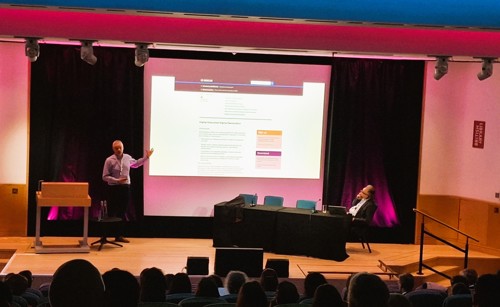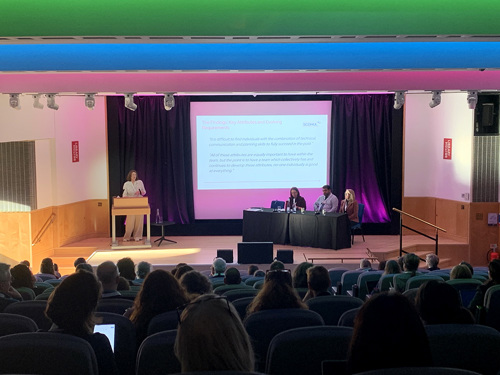SCONUL Spring Conference 2025
The SCONUL Spring conference, The library and digital transformation, took place on 3 March at The British Library Knowledge Centre, in London.
Bringing members together the conference explored technology-enabled library spaces supporting research and teaching, the development of the systems’ librarian role, data-driven decision-making and service development, and AI skills for education and employability.
Two SCONUL reports were launched at the conference, The Library Technology Landscape: Results of the SCONUL Technology Survey 2024 and the Future of the Systems Librarian report.
Keynote speech
Collaboration and Shared Services in HE: engaging with the inevitable shift
Professor Mark Thompson, Professor in Digital Economy at University of Exeter

Mark's presentation was on the view that organisations in the HE sector differentiate themselves, and generate value, through research, teaching, and impact: everything else is ‘fair game’ for consuming collectively. At a time when the sector – including libraries - faces unprecedented, possibly existential, financial challenges, contemplating a transition towards consolidated operating models based around standard back-office functions appears increasingly less radical than might once have been the case. This, intentionally disruptive, talk made the case for such a consolidation, and (based on a recent EPSRC study) articulated practical suggestions for a way forward.
Presentations
The library technology landscape
Anna O’Neill, Librarian at University of Warwick and Ann Rossiter, Executive Director at SCONUL.
Anna and Ann presented the findings of The Library Technology Landscape, the results of SCONUL’s inaugural technology survey, which was launched at the conference. The report captures a detailed picture of the complex set of interoperable technologies employed by libraries, and identifies which technologies are used most widely as well as perceptions of their functionality and value for money.
They highlighted interesting findings and explored how the results can be used to support procurement decisions for SCONUL members. They also considered how the insights and opportunities from the report can inform our consideration of the sector’s use of technology and how we can make the best use of our collective investment.
Lightning talks on Business intelligence for libraries
Dominic Dixon, Head of Assessment and User Experience at Cambridge University Libraries, Michelle Halpin, Digital Services and Content Developer at University of Sunderland, Thomas Kistell, Systems Support Specialist at Sheffield Hallam University, and Amy Stubbing, University Librarian at Solent University.
Dominic's talk explored how Cambridge University Library is developing its use of data to support decision-making. As the university’s new Data Office focuses on building trust and confidence in data at an institutional level, they are strengthening their capacity to better understand and demonstrate the library’s impact – while also rethinking what innovation in this space really means.
Michelle gave an overview of the different approaches that University of Sunderland Libraries and Learner Development are taking to connect, analyse and share data insights – leveraging Alma Data Visualisation, PowerBI and machine learning modelling to enable agile data access and inform best value procurement and service delivery.
Thomas talked about the Library Data Hub created to showcase internal reports and to help staff talk about their data needs at Sheffield Hallam University.
Amy walked us through a new data fluency self-assessment tool created for staff at Solent University. She covered the collaborative approach taken by the library and the data governance team to build a University-wide approach to data fluency.
Panel discussions
Digital transformation of the library
Liam Earney, Managing Director for Higher Education and Research, and Executive Director of Digital Resources at Jisc, Fiona Greig, Director of Knowledge & Digital Services at University of Winchester, Mark Hughes, Head of Libraries at Cardiff Metropolitan University, and Wendy White, Director Library and Learning Services (University Librarian) at University of Southampton.
This panel discussion explored the current and future landscape for libraries around the deployment of technologies and teams and asked radical questions about how we might rethink the way that we work to meet the challenges we face.

The Systems Librarian in 2030
Adnan Adil, Systems, Subscriptions and Licensing Manager at London South Bank University, Caroline Cooke, Deputy Director, Library Services at Royal Holloway, University of London, Georgina Dimmock, Head of Library Systems, Skills, Collections and Archives, University of Northampton, and Sue Egleton, University Librarian, University of Reading.
The Systems Librarian is a strategically vital role for libraries, supporting a complex range of interoperable technologies and acting as a bridge between different stakeholders.
This session included details of the findings of a survey conducted by SCONUL on the future of the systems librarian which launched at the conference. A panel discussed the future shape of the systems librarian role including exploring the strengths and weaknesses of library systems support structural models; pay, recruitment and succession planning; and the skills and attributes the role requires.
The Systems Librarian in 2030 panel presentations:
- The Systems Librarian in 2030, Georgina Dimmock, University of Northampton
- Senior Manager Viewpoint: how the systems librarian role has changed, Sue Egleton, University of Reading
- Systems Librarian Secondment Case Study and PhD research insights, Syed Adnan Adil, London South Bank University
- Future of the Systems Librarian Community of Interest Group (CIG), Caroline Cooke, Royal Holloway University of London